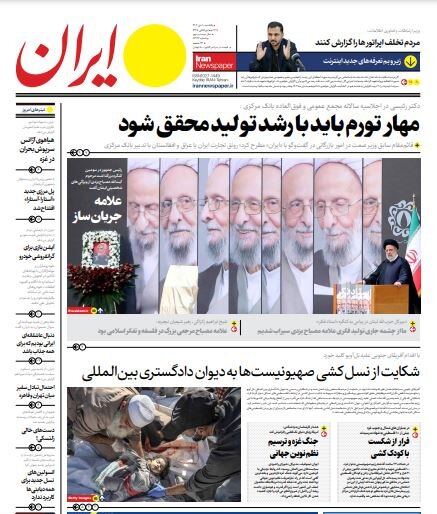TEHRAN PAPERS

TEHRAN - In an article, the Iran newspaper discussed the repeated positions of the West regarding the nuclear activities of our country and said: The purposeful report of the Agency and the alleged statement of the U.S. and the European troika cannot be seen separately from the crises that have paralyzed the western front in the Ukraine war and the Gaza crisis.
Especially since the Zionist regime is the main party to the war that started following the surprise of this regime in the October 7 attack by Hamas, and despite Israel's wide-scale attacks against the civilian population of Gaza and the unprecedented support of the United States, it has not been able to achieve its minimum demands in the field. This failure against the resistance front, which is supported by the Islamic Republic, has led Israeli officials to the policy of intensifying pressure on Iran. In such an atmosphere, the agency tries to magnify worthless, undocumented information and turn conventional questions into strange questions about Iran, to bring Iran's peaceful nuclear activities to the top of the news with a repetitive game and to arouse global sensitivity towards it; This is undoubtedly done to turn the attention away from the crimes committed by the Zionist authorities against the defenseless people of Gaza these days.
Sobh-e-No: Russia should not be allowed to play Iran's card
In an interview with Mehdi Khorsand, an international affairs expert, Sobh-e-No discussed Russia's recent positions on Iran's three islands in the Persian Gulf and wrote: Balanced policy does not allow any of the eastern or western powers to play with Iran's card. But it should be noted that the presence of Lavrov, the Minister of Foreign Affairs of Moscow, in the Morocco meeting does not refer to Russia's hostility towards Iran. There are no permanent friends or enemies in the international arena, and countries act and react in international relations based on their national interests. The political and diplomatic reactions show that Iran is not joking with any side about its territorial integrity and independence, and is not negligent in opposing the arrogance of the West. The diplomatic apparatus should also take the path of a "de-risking strategy" about Russia in order not to be harmed by the change in behavior of its northern neighbor and to consolidate its position as an emerging regional and global power.
Hamshahri: Is the opening of the embassies of Iran and Egypt upcoming?
Hamshahri talked to Hassan Hanizadeh, a senior expert on regional issues, and discussed speculations about the relations between Tehran and Cairo and said: After the presidents of Iran and Egypt met and talked in recent months, first on the sidelines of the summit of the Organization of Islamic Cooperation and then on the phone, a new chapter was opened in bilateral relations. The observers of the developments in the region believe that in the current situation, both sides have the necessary will to improve the level of relations, an approach that has increased hopes for the opening of the embassy. Due to its special geopolitical position, Egypt is very important in regional and even international relations, both for Iran and for Arab-Islamic states. Another positive aspect is that Jordan is likely to be the next destination after improving relations with Egypt. The point here is that America's regional performance has also played an effective role in the turn of some Arab governments towards Iran. Experience has shown that whenever some Arab governments become pessimistic about Washington's regional policies, they move towards promoting cooperation with Iran.
Shargh: Negotiation best way to resolve the dispute in Arash gas field
In a note, Shargh addressed the disputes over the Arash (Durra) gas field and quoted Mohammad Dehghan, the legal deputy of the president, as saying: Negotiation is the best way to resolve the dispute over the Arash gas field, but if Kuwait wants to exploit this field, so will Iran. Arash gas field is common and a part of this field belongs to Iran, and we have already drilled a well in that field, but the well has been closed. The government of Kuwait has made unjustified claims and thinks that all the fields belong to it, which is baseless. The Ministry of Foreign Affairs is responsible for solving this issue through negotiations, but if the Kuwaiti government wants to exploit this field, we will start exploiting it according to the wells we have dug or will dig. But it is better to have common exploitation and common interests. If Saudi Arabia has a common border with us, we believe in a common exploitation with this country so that the field is not destroyed and it is exploited to the maximum. We do not expect Kuwait to make claims beyond its limits.

No comments:
Post a Comment